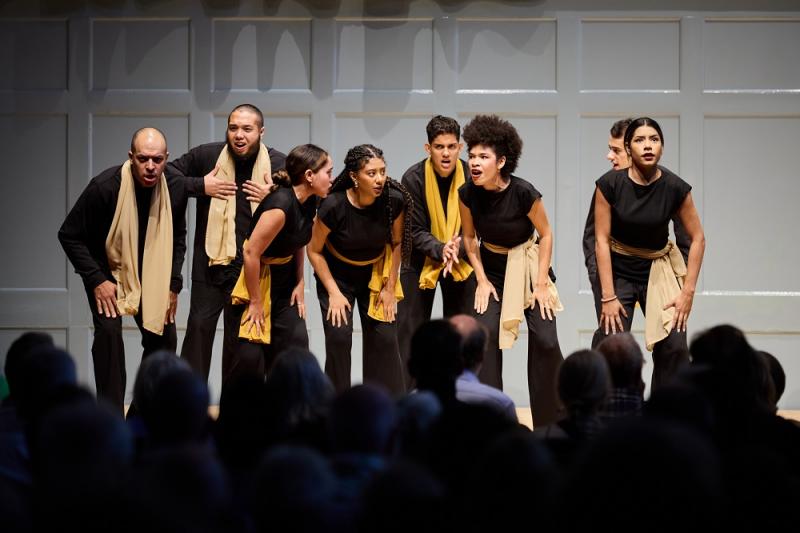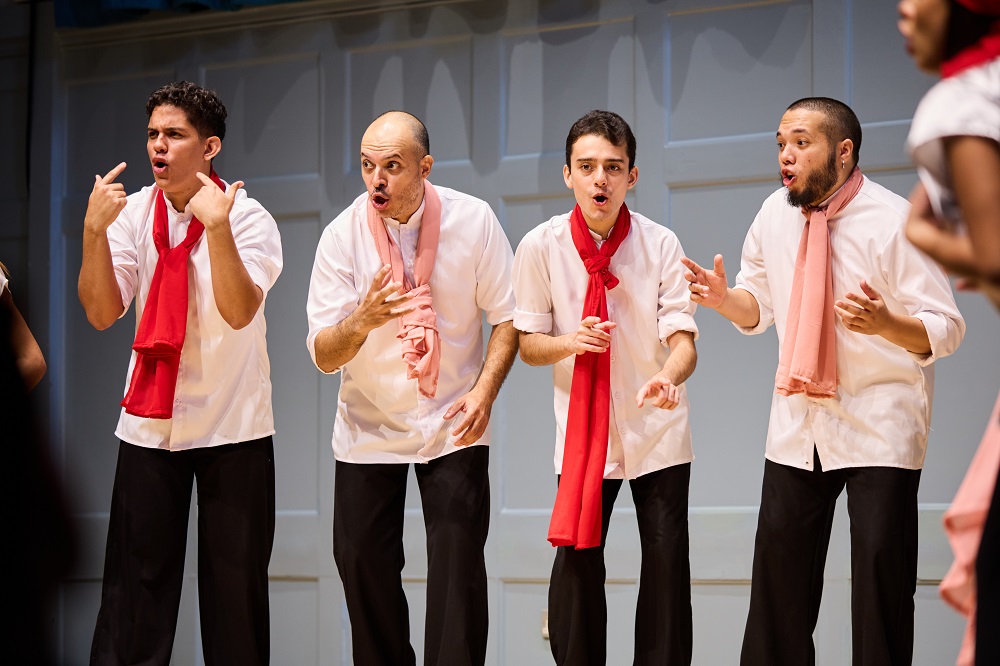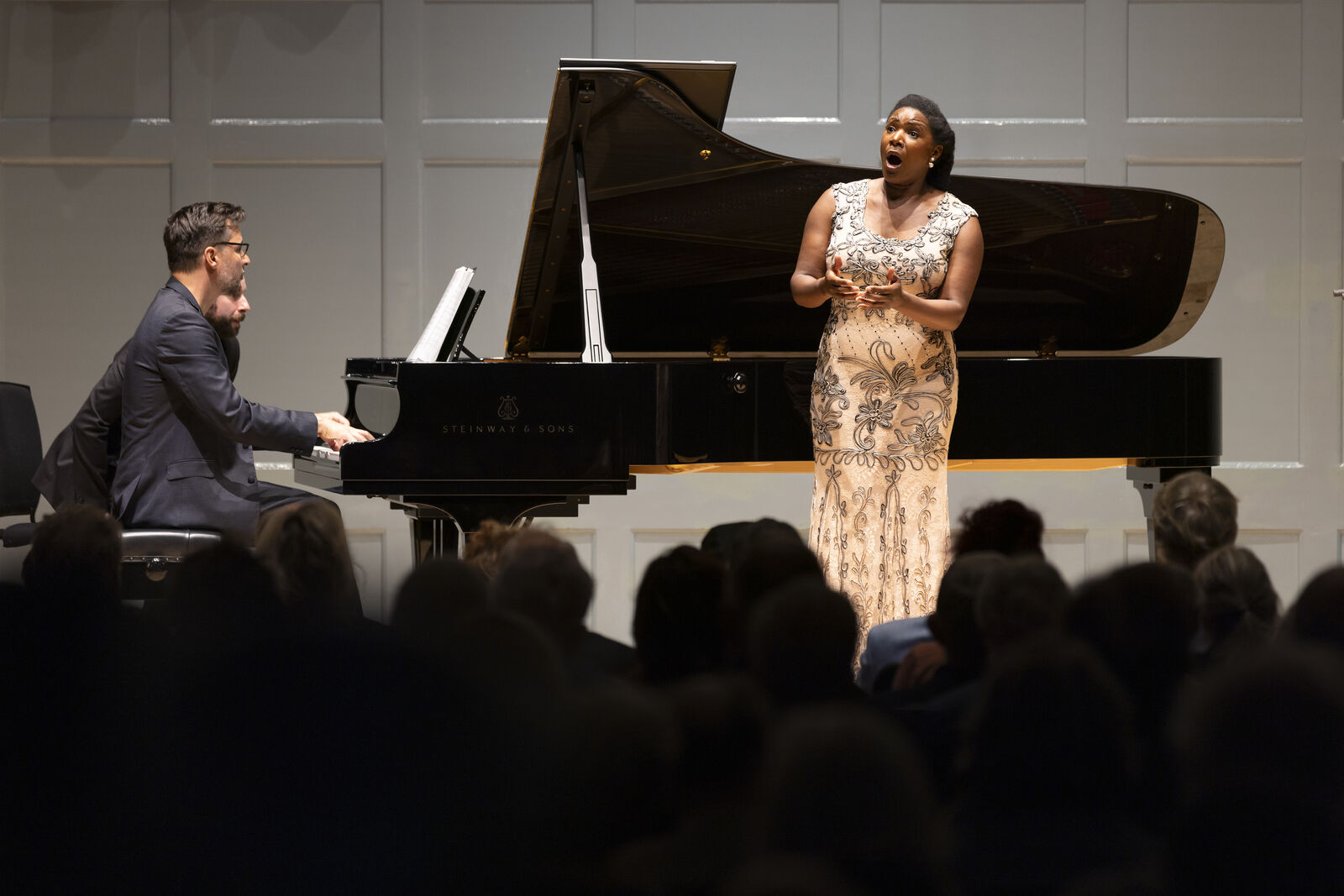Schola Cantorum de Venezuela / Llewellyn, Lepper, Edinburgh International Festival 2024 review - scorching energy and deep tenderness | reviews, news & interviews
Schola Cantorum de Venezuela / Llewellyn, Lepper, Edinburgh International Festival 2024 review - scorching energy and deep tenderness
Schola Cantorum de Venezuela / Llewellyn, Lepper, Edinburgh International Festival 2024 review - scorching energy and deep tenderness
Chamber music series kicks off with an explosion of song

The Queen’s Hall isn’t going to know what has hit it after the opening weekend of this year’s Edinburgh International Festival. What’s usually the festival’s demure home of chamber music – string quartets, piano trios and so on – was still recovering from Jakub Józef Orliński’s theatrics from Saturday morning, when it encountered this scorching performance of choral music from the Schola Cantorum de Venezuela (★★★★★).
The Schola Cantorum’s main reason for being in Edinburgh last weekend was to take part in Golijov's La Pasión según San Marcos in the Usher Hall on Saturday evening, but hearing them on their own was a terrifically compelling experience. You sensed the same energy coursing through their veins, but also the greater tenderness and deeper focus that comes from performing their own music on their own terms.
The vast majority of their programme came from the Americas, mostly Latin America; and they divided it into a first half of Christian music and a second of exploring ancestral rituals. But if you hadn’t known that then you wouldn’t have been able to sense the dividing line. Their first half of Lachrymosas and Alleluias was a world away from the refined precision of a western cathedral choir. This sacred music by the likes of Alvarez and Runestad thumped with tribalistic energy, and demonstrated the Ginastera had in him the raw material of a modernist: who knew?!  Be it sacred or secular music, the young performers (pictured above by Andrew Perry) danced,
Be it sacred or secular music, the young performers (pictured above by Andrew Perry) danced,
leapt and drummed around the stage as they sang, their second half beginning of Bilbao’s invocation to St John sounding like an animalistic ritual rather than a hymn to a Christian saint. Yet there was also space for fun in El guayaboso, and even some beautiful part songs from Guastavino and Castellanos.
Often the singing was raw and unchecked, but that only heightened its emotional power, and the seventeen singers moved with such energy and passion that it was impossible not to be swept away by them. Interestingly, the only piece where they struggled, with its stillness and unity, was the most western one, James MacMillan’s O Radiant Dawn, which took quite a while to settle. That only points up their strengths and priorities, though, and I’d happily sacrifice some of that poetic peace for the unchecked enthusiasm of seeing such a team in their prime.
Director María Guinand was the presiding genius over the whole thing, and she spoke compellingly about each of the pieces they sang. Most movingly, she dedicated the whole concert to their beloved home country, “a country that deserves a future.” We can all agree with that.  There was a much more conventional song recital a couple of mornings later. Elizabeth Llewellyn ★★★★) sang her songs in clearly organized sequences with breaks in between, and Simon Lepper’s piano line (Lepper and Llewellyn pictured above by Jess Shurte) was as well behaved as her soprano voice. That voice is beautiful, creamy, voluptuous. The most remarkable thing about the concert was that when she began to sing her first sequence, Finzi’s Till Earth Outwears, she sounded like a contralto, so confident and rich did the voice sound at the very bottom of its range. Elsewhere, the characteristic ripeness was regularly evident in the upper regions of the voice, and if the very top sometimes lacked the nth degree of precision then you can forgive almost anything when it's 11:00 in the morning.
There was a much more conventional song recital a couple of mornings later. Elizabeth Llewellyn ★★★★) sang her songs in clearly organized sequences with breaks in between, and Simon Lepper’s piano line (Lepper and Llewellyn pictured above by Jess Shurte) was as well behaved as her soprano voice. That voice is beautiful, creamy, voluptuous. The most remarkable thing about the concert was that when she began to sing her first sequence, Finzi’s Till Earth Outwears, she sounded like a contralto, so confident and rich did the voice sound at the very bottom of its range. Elsewhere, the characteristic ripeness was regularly evident in the upper regions of the voice, and if the very top sometimes lacked the nth degree of precision then you can forgive almost anything when it's 11:00 in the morning.
She sounded at her best in the English language songs, though. The Finzi sequence, alongside Coleridge-Taylor’s Six Sorrow Songs were full of communicative directness and that characteristically English sense of restraint in line with understated melancholy. Her Dvořák Love Songs were also very fine, but her Strauss and Chausson settings were more buttoned-up, the nuances of the language and even the dynamics of the voice all straightened out to a fairly standard mezzo-forte. Simon Lepper’s piano line was consistently essential, however, most especially in the Puccini selection where the piano sang out convincingly a lot of the arching melodies you’d expect from Puccini’s operas. In fact, three of the songs shared melodies from La bohème and La Rondine.
The EIF has largely done away with extensive programme booklets this year and replaced them with freesheets. To compensate for the lack of sung texts, a supertitle screen projects the translations above the singer’s head, a massive improvement in terms of directness and communication. They also provided the morning’s lightest moment: a titter broke out among the audience when the screen announced the title of Finzi’s fifth song: "It never looks like summer". Rarely has that been truer than this year!
Explore topics
Share this article
The future of Arts Journalism
You can stop theartsdesk.com closing!
We urgently need financing to survive. Our fundraising drive has thus far raised £49,000 but we need to reach £100,000 or we will be forced to close. Please contribute here: https://gofund.me/c3f6033d
And if you can forward this information to anyone who might assist, we’d be grateful.

Subscribe to theartsdesk.com
Thank you for continuing to read our work on theartsdesk.com. For unlimited access to every article in its entirety, including our archive of more than 15,000 pieces, we're asking for £5 per month or £40 per year. We feel it's a very good deal, and hope you do too.
To take a subscription now simply click here.
And if you're looking for that extra gift for a friend or family member, why not treat them to a theartsdesk.com gift subscription?
more Classical music
 BBC Proms: Ehnes, Sinfonia of London, Wilson review - aspects of love
Sensuous Ravel, and bittersweet Bernstein, on an amorous evening
BBC Proms: Ehnes, Sinfonia of London, Wilson review - aspects of love
Sensuous Ravel, and bittersweet Bernstein, on an amorous evening
 Presteigne Festival 2025 review - new music is centre stage in the Welsh Marches
Music by 30 living composers, with Eleanor Alberga topping the bill
Presteigne Festival 2025 review - new music is centre stage in the Welsh Marches
Music by 30 living composers, with Eleanor Alberga topping the bill
 Lammermuir Festival 2025 review - music with soul from the heart of East Lothian
Baroque splendour, and chamber-ensemble drama, amid history-haunted lands
Lammermuir Festival 2025 review - music with soul from the heart of East Lothian
Baroque splendour, and chamber-ensemble drama, amid history-haunted lands
 BBC Proms: Steinbacher, RPO, Petrenko / Sternath, BBCSO, Oramo review - double-bill mixed bag
Young pianist shines in Grieg but Bliss’s portentous cantata disappoints
BBC Proms: Steinbacher, RPO, Petrenko / Sternath, BBCSO, Oramo review - double-bill mixed bag
Young pianist shines in Grieg but Bliss’s portentous cantata disappoints
 theartsdesk at the Lahti Sibelius Festival - early epics by the Finnish master in context
Finnish heroes meet their Austro-German counterparts in breathtaking interpretations
theartsdesk at the Lahti Sibelius Festival - early epics by the Finnish master in context
Finnish heroes meet their Austro-German counterparts in breathtaking interpretations
 Classical CDs: Sleigh rides, pancakes and cigars
Two big boxes, plus new music for brass and a pair of clarinet concertos
Classical CDs: Sleigh rides, pancakes and cigars
Two big boxes, plus new music for brass and a pair of clarinet concertos
 Waley-Cohen, Manchester Camerata, Pether, Whitworth Art Gallery, Manchester review - premiere of no ordinary violin concerto
Images of maternal care inspired by Hepworth and played in a gallery setting
Waley-Cohen, Manchester Camerata, Pether, Whitworth Art Gallery, Manchester review - premiere of no ordinary violin concerto
Images of maternal care inspired by Hepworth and played in a gallery setting
 BBC Proms: Barruk, Norwegian Chamber Orchestra, Kuusisto review - vague incantations, precise laments
First-half mix of Sámi songs and string things falters, but Shostakovich scours the soul
BBC Proms: Barruk, Norwegian Chamber Orchestra, Kuusisto review - vague incantations, precise laments
First-half mix of Sámi songs and string things falters, but Shostakovich scours the soul
 BBC Proms: Alexander’s Feast, Irish Baroque Orchestra, Whelan review - rapturous Handel fills the space
Pure joy, with a touch of introspection, from a great ensemble and three superb soloists
BBC Proms: Alexander’s Feast, Irish Baroque Orchestra, Whelan review - rapturous Handel fills the space
Pure joy, with a touch of introspection, from a great ensemble and three superb soloists
 BBC Proms: Moore, LSO, Bancroft review - the freshness of morning wind and brass
English concert band music...and an outlier
BBC Proms: Moore, LSO, Bancroft review - the freshness of morning wind and brass
English concert band music...and an outlier
 Willis-Sørensen, Ukrainian Freedom Orchestra, Wilson, Cadogan Hall review - romantic resilience
Passion, and polish, from Kyiv's musical warriors
Willis-Sørensen, Ukrainian Freedom Orchestra, Wilson, Cadogan Hall review - romantic resilience
Passion, and polish, from Kyiv's musical warriors
 BBC Proms: Faust, Gewandhausorchester Leipzig, Nelsons review - grace, then grandeur
A great fiddler lightens a dense orchestral palette
BBC Proms: Faust, Gewandhausorchester Leipzig, Nelsons review - grace, then grandeur
A great fiddler lightens a dense orchestral palette

Add comment